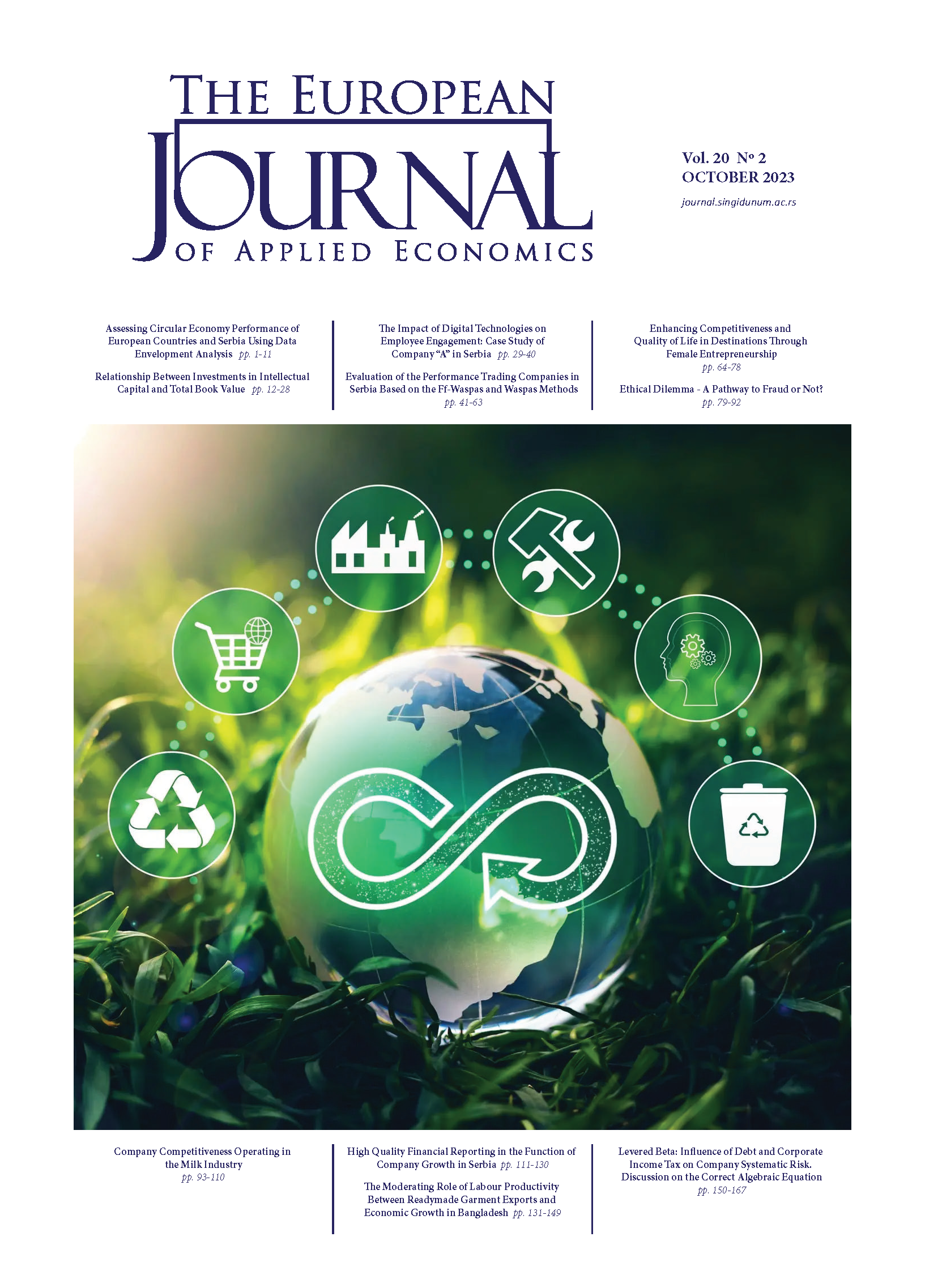ETHICAL DILEMMA - A PATHWAY TO FRAUD OR NOT?
Sažetak
Finansijske prevare zaposlenih su pojava koja je prisutna u poslovnim i profesionalnim krugovima već duže vreme, međutim, sa pojavom sve sofisticiranijih tehnika za to, pravi izazov je kako sprečiti prevare. Cilj ovog istraživanja je da dokaže da kada se ukaže prilika za finansijsku prevaru, etički principi i kodeksi ponašanja prevazilaze lične i kolektivne motive zaposlenih. Takođe, trudimo se da potvrdimo da stalna obuka zaposlenih na temu etičkog kodeksa smanjuje mogućnost finansijskih prevara u kompaniji. U cilju pronalaženja dokaza koji potkrepljuju naša istraživačka pitanja, sprovedena je anketa u formi upitnika, a ispitanici su bili zaposleni iz sektora računovodstva, finansija, revizije, kao i diplomirani studenti iz oblasti računovodstva, revizije i menadžmenta. u većim gradovima u Republici Srbiji. Rezultati istraživanja su pokazali da skoro 50% ispitanika nikada ne prolazi obuku iz oblasti primene etičkog kodeksa u stvarnim životnim slučajevima, a 20-30% ostaje neodlučno o svakoj etičkoj dilemi iznesenoj u upitniku, što potvrđuje našu hipotezu da postoji mnogo prostor za sprovođenje etičke obuke kao najvažnije tehnike prevencije prevara u srpskim preduzećima.
Reference
[1] Adams, G. W., Campbell, D. R., Campbell, M., & Rose, M. P. (2006). Fraud prevention. The
CPA Journal, 76(1), pp. 56.
[2] Agus, A., Ghozali, I. (2019), Mediating Effects of Audit Quality in Relationship Between Audit
Ethics and Litigation: An Empirical Study, International Journal of Economics and Business
Administration, Volume VII, Issue 2, pp. 91-100.
[3] American Institute of Certified Public Accountants, Consideration of Fraud in a Financial
Statement Audit (2002), Auditing Standards Executive Committee.
[4] Anand, V., Dacin T.M., Murphy P.R. (2015), The Continued Need for Diversity in Fraud
Research, Journal of Business Ethics (131), pp. 751-755.
[5] Association of Certified Fraud Examiners, 2004 Report to The Nation on Occupational Fraud
and Abuse (2004).
[6] Bishop, T.R. (1992), Integrating Business Ethics into an Undergraduate Curriculum, Journal of
Business Ethics, Vol. 11, No. 4, pp. 291-299.
[7] Cohen, J., Ding, J., Lasage, C., Stolowy, H. (2010), Corporate Fraud and Manager’s Behavior:
Evidence from the Press, Journal of Business Ethics (95), pp. 271-315.
[8] Crane, A., Matten, D. (2006), Business Ethics, 2nd edtion, Oxford: Oxford University Press,
pp. 27-29.
[9] Cressey, D. R. (1953). Other people’s money: A study of social psychology of embezzlement,
Glenco, IL,Free Press.
[10] Donaldson, T., Werhane, P.H. (1993), Ethical Issues in Business: A Philosophical Approach,
4th edition, Englewood Cliffs, New York.
[11] Dorminey, J., Fleming, A.S., Kranacher, M.J., Riley Jr., R.A., 2010. Beyond The Fraud
Triangle: Enhancing Deterrence of Economic Crimes. The CPA Journal July 2010.
[12] Dorminey J., Fleming, A. S., Kranacher, M. J., Riley Jr., R. A., 2012. The Evolution of Fraud
Theory, Issues in Accounting Education, Vol 27 (2): pp. 555-579.
[13] Duska, R., Duska, B.S., Ragatz, J. (2011), Accounting Ethics, 2nd edition, A John Wiley &
Sons.
[14] Fernandhytia, F., & Muslichah, M. (2020). The effect of internal control, Individual morality
and ethical value on accounting fraud tendency, Media Ekonomi Dan Manajemen, 35(1), pp.
121-127.
[15] Frank, G., Sarham, M., Fisher, S. (1990), Business & Academy: Forging an Ethics Partnership,
Management Accounting, June, pp. 47-49.
[16] Friedbert, A. (1998), Ethical Aspects of Internal Auditng, Journal of Business Ethics, pp. 895-
904.
[17] Hess, M. F., Cottrell Jr, J. H. (2016). Fraud risk management: A small business
perspective. Business Horizons, 59(1), pp. 13-18.
[18] Hoffman, W.M., Frederik, R.E., Schwartz, M.S. (2014), Business Ethics – Reading an Cases
in Corporate Morality, 5th edition, John Wiley & Sons, Inc.
[19] Irianto, G. Novianti, N., Rosalina, K., Firmanto, Y. (2009). Integrity, unethical behavior, and
tendency of fraud, Journal of International studies, 6(2), pp. 144-163.
[20] Kohlberg, L. (1984), Essays on Moral Development, New York: Harper & Row, Publishers.
[21] Leung, F., Cooper, B. (1995), Ethical Dilemmas in Accountancy Practice, Australian
Accountant, May, pp. 28-33.
[22] Mintz, S.M. (1992), Cases in Accounting Ethics and Profesinalism, New York: McGraw Hill,
Inc., 2nd edition.
[23] Morales, J., Gendron, Y., & Gue´nin-Paracini, H. (2014). The construction of the risky
individual and vigilant organization: A genealogy of the fraud triangle. Accounting,
Organizations and Society, 39, pp. 170–194.
[24] Murphy, P.R., Dacin, T.M. (2011), Pshychological Pattways to Fraud: Understanding and
Preventing Fraud in Organizations, Journal of Business Ethics, Springer.
[25] Okleshen, M., & Hoyt, R. (1996). A cross cultural comparison of ethical Perspectives and
decision approaches of business students: United States of America versus New Zealand,
Journal of Business Ethics, 15(5), pp. 537-549.
[26] Roth, J. (2017), How to Audit Culture, Internal Auditor, Institute of Internal Auditors.
[27] Russel, A.J. (2019), The Right Path, Internal Auditor, Institute of Internal Auditors.
[28] Somers, M.J. (2001), Ethical Codes of Conduct and Organizational Context: A Study of The
Relationship Between Codes of Conduct, Employee Behavior and Organizational Values,
Journal of Business Ethics (30), pp. 189-195.
[29] Sujeewa, G. M. M., Yajid, M. S. A., Azam, S. M. F., & Dharmaratne, I. (2018). The new fraud
triangle Theory-Integrating ethical values of employees. International Journal of Business,
Economics and Law, 16(5), pp. 52-57.
[30] Sutherland, E. H., Cressey, D. R., & Luckenbill, D. F. (1992). Principles of criminology (11th
ed.). New York: General Hall Inc.
[31] Wells, J.T. (2012), Inside the fraudster’s mind, Internal Auditor, Institute of Internal Auditors,
Vol. 69 Issue 2.
[32] Wheelwright, P.E. (1959), Heraclitus, Princeton University Press.


